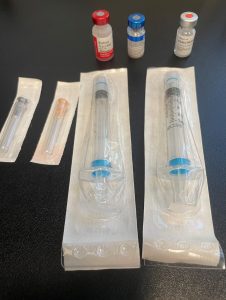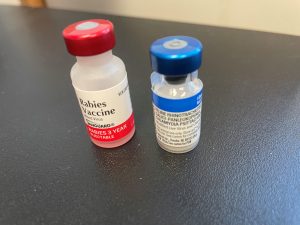5.4 Vaccination Terminology
Overview
A vaccination is an administration of a vaccine or antigen that stimulates an immune response to protect against an infectious disease, bacteria, or toxin. Vaccinations are an important part of overall veterinary care. Routine vaccinations are usually done once a year, along with a wellness examination. The primary benefit of vaccinations is to limit the risk of preventable viruses that cause life-threatening conditions. When considering a population of animals, we try to create herd immunity, where enough of the population is vaccinated that the risk of exposure decreases for the unvaccinated individuals, because those that are vaccinated do not transmit the disease.

Vaccination is controlled exposure of an animal’s immune system to something that causes disease. Vaccination is the act; immunization is the desired result. In veterinary medicine, most vaccines are developed against viruses, but some protect against specific bacteria or toxins. When an animal is vaccinated, its immune system recognizes the foreign proteins and builds up a response to them. Part of that response is the creation of antibodies, which are proteins that bind to the pathogen and lead to its destruction (humoral immunity). Another part of that response is creation of cells within the animal’s body that will destroy that pathogen (cellular immunity). Some of those cells are memory cells which are capable of generating a faster and stronger response every time the animal is re-exposed to the pathogen. This means that vaccinated animals, which have created a store of memory cells, can respond more quickly to any natural exposure to the pathogen and are significantly less likely to become ill (Kustritz, 2022).
Types of Vaccinations
Live vaccines: Use portions of viruses or bacteria to generate an immune response
Modified live vaccines: Contain whole viruses that are not dead but are treated so that they can no longer cause disease
Killed or inactivated vaccines: Contain inactive whole viruses or bacteria. They are more stable for handling as they are incapable of causing the disease.

Timing of Vaccinations
Timing of vaccinations will vary between species. See Chapter 7 and 8, where this is discussed in full detail. Most species receive immunity from their mother for a period of time. Once that immunity starts to decrease, the need for vaccination rises. Once an animal is fully vaccinated, it is said they are “protected” from the disease or infection, meaning that the risk of acquiring the disease is minimal or limited.
Adverse Effects of Vaccines
Vaccinations, like medicine, can have adverse effects. After vaccinations, patients should wait 15 minutes before leaving the clinic, as most adverse reactions occur fairly quickly.
Allergic reactions can include swelling, usually of the face and ears, vomiting, and diarrhea, among others. These reactions are not very common. Most of the time, animals are tired for 1–2 days following vaccination, and might be a bit sore at the injection site.
Vaccination Abbreviations and Terms
Antigen: is a substance that is foreign to the body that simulates an immune response
antibody titer: A measurement of the antibodies in an animal. This can be used to determine if an animal is protected from a particular disease.
Core Vaccine: a vaccine that should be administered to all cats/dogs or other species
Immunity: is the body’s ability to resist disease
MLV: Modified live vaccine
Non-core vaccine: an optional vaccination that should be considered based on the animal’s exposure risk.
resistant: Not susceptible; generally resistant to a disease, meaning less likely to get it
vacc: Vaccine
Exercises
Attribution
Unless otherwise indicated, material on this page has been adapted from the following resource:
Root Kustritz, M. (2022). Veterinary preventative medicine. University of Minnesota. https://pressbooks.umn.edu/vetprevmed/, licensed under CC BY-NC 4.0
Image Credits
(images are listed in order of appearance)
Cat vaccinations with needle and syringe by Kelly Robertson, NorQuest College. Used with permission.
Rabies and feline vaccination by Kelly Robertson, NorQuest College. Used with permission.
The treatment or administration of a substance to stimulate immunity to a pathogen or infectious disease; often created from an inactive or weakened form of the infectious agent
The immune system's over-reaction to a substance or antigen

